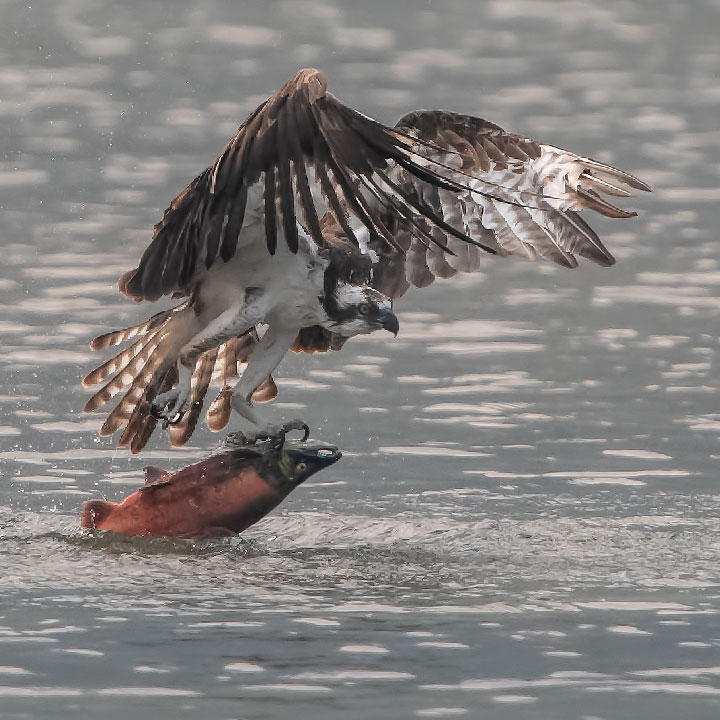The West Arm of Kootenay Lake has an unusually large warm-season population of ospreys. As such, they have become a symbol of the Lake, with both a ferry and a community foundation named after them.
Ospreys feast on fish caught live. But, just try to capture a picture of an osprey lifting a fish from the Lake. The problem is that it happens amazingly quickly somewhere over a rather large area. I have only managed to record the event once before.
Consequently, this morning’s shot of a (male) osprey lifting a (male) Kokanee from the Lake is one of my most satisfying shots of the year.
An Osprey and its catch.


A One Foot Catch!
And this time, definitely a Kokanee…
However did you get such a spectacular shot! Also, how can you tell the female from the male Osprey?
Jo, it is a matter of anticipating what might happen and preparing for it. A fallible indicator of a female osprey is a dark necklace. This osprey clearly lacks this feature.
Well done, Alistair!
Still, one wonders how he came to grab the fish upside down? Was there then a tussle?
Best of the season…
T
Trevor, there was a considerable amount of fussing around while the osprey was trying to lift the fish. However, I just don’t know why the kokanee is upside down.
Wow that’s a huge catch! How far was he able to carry it? Did he drag it in the water for a distance? Amazing shot.
Grace, yours is a good assessment. Indeed, the fish probably outweighed the bird. The fish was dragged across the water for two or three flaps of the wings, but eventually the osprey had to abandon it. While the event made for a wonderful picture, it did not make for a wonderful meal.
Wow Alistair, great image.
Thanks for this caught in the act action shot, Alistair!
Gotcha! You’re coming home for dinner little (not so little) fish.
Great shot! Not only is the osprey great but you captured a wonderful shot of the fish. What kind of lens did you use and how close were you?
Sue, the lens is a fixed focus 300 mm with a 1.4 x extender. As to distance, it is difficult to judge. I was standing at the edge of the water and the bird was perhaps 40 metres offshore. There is an interesting tradeoff. If the bird is too distant, the image is small and so lacks detail. Further, the constantly adjusting focus has probably locked onto the distant water rather than the bird. However, if the bird is really close (or the lens is too long), I cannot pan accurately enough to follow its high-speed plunge to the lake, then its slow emergence from the water, and finally the sudden vigorous departure. It is just tricky to keep the bird in the camera frame. It all happened so very quickly and was so consuming that there was no time for any camera adjustments. I just shot with my birding default of f/5.6, 1/3200 sec., and a floating ISO.
Congrats!!
You must of been ecstatic when you realized it the shot was in focus.
Travis, chuckle. I took many pictures (hunting, plunging, surfacing with catch, flying off) most of which were in focus. Although the bird was changing position, the camera’s focus tracking worked fairly well. But, the odd image that I would have liked to have used was blurry. Yet, I was pleased that the image I really wanted to use (fish almost out of water; head of bird visible) was in focus.
Wow, just WOW
Beautiful capture. You are right… it happens amazingly fast from the plunge to departure. I’m not a photographer but an osprey watcher & love to see photos of osprey.